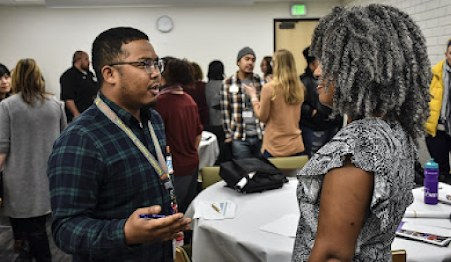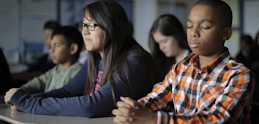By Sam Piha
For successful delivery of SEL content has to do with the need to model it to the students to effectively teach it. SEL is necessarily responsive and works moment-to-moment over time; because it’s all about behaving and interacting, a “do as I say, not as I do” approach doesn’t work. Students learn and emulate self-awareness from someone who is demonstrating it. For this reason, educators must continue to develop their own social emotional skills so they can set the example — working on their personal development, becoming more self- and socially aware, learning how to manage their own stress, and walking the talk.” - Heather Daly, Courageous Hearts and Normandie Nigh, A World Fit for Kids
 |
| Dr. Dale Blyth |
Dr. Dale Blyth,
University of Minnesota, emphasizes that social emotional skills are “taught” through direct instruction and “caught” through adult modeling and the program values and culture. We know that the success of any program to promote social emotional and character skills is partially dependent on the social emotional and character skills of the adult leaders.

Whoever our students may be, whatever subject we teach, ultimately we teach who we are.” - Parker Palmer, Educator
Below is a reflection from Stu Semigran, Founder of EduCare Foundation, on the importance of adult staff and their social emotional skills.
 |
| Stu Semigran |
“We can only truly teach or impact our students in the value and competencies of SEL to the degree that SEL is becoming part of our own repertoire… our own way of being. As we commit to our personal SEL self-development, this naturally influences our instructional practices, programs, and decisions. SEL becomes more than a collection of lesson plans, activities, or programs. It becomes a way of teaching… a way of being… a way of living. Then we as role models can deeply assist our students as they evolve in their own mastership of SEL. This has implications for how we hire and provide professional development.There are a variety of valuable SEL skills that can be addressed through staff professional development. EduCare Foundation teaches “Eight Skills for Heartset® Education”. Some of these include tools for self-awareness, mindfulness, self-forgiveness, and empathetic listening. When these and other SEL skills are personalized and become our baseline, then we are more equipped to create an SEL styled climate with SEL curriculum and activities that can really “stick with” and impact our students.”
FOCUSED PROGRAM PRACTICES
Social emotional learning (SEL) is very important for teens and afterschool programs are well equipped to promote SEL skills. Below are some social emotional learning practices and activities for older youth that can be seamlessly incorporated into afterschool programs:
Mindfulness - The term ‘mindfulness’ is often associated with calm or total peace. But that’s not what it’s about. Mindfulness is a practice — meaning, something to be returned to again and again — that involves focusing on the present moment and accepting whatever is showing up. Doing this each day can help foster a feeling of centeredness, which in turn can result in reduced stress and more regulated emotions.
You can register for
Integrating Mindfulness into Afterschool Youth Programs: A Mini-Course to learn more
here.
This
animated video shows young children how to slowly inhale by pretending to smell a flower and to exhale by pretending to blow out a candle. The video was developed for a study by the Stanford Project on Adaptation and Resilience in Kids (SPARK Lab) at Stanford University.
Engaging Youth in Civic Action - In her article,
How to Teach Older Students Social-Emotional Skills? Try Civics, Arianna Prothero makes the case that “
Understanding other points of view, solving problems collaboratively, and building relationship skills all come to mind [in teaching civics]. For many educators, those skills will sound familiar, because they’re many of the same taught through social-emotional learning…Civic engagement can be a meaningful way to teach and reinforce social and emotional skills. That’s especially true for middle and high schoolers who are searching for their place in their communities and the world and might not otherwise connect with traditional social-emotional lessons.”
Circle Meetings - We know that bringing together young people and offering them the opportunity to have their individual voices heard in the larger community is an important practice. We are referring to ‘talking or sharing circles’ - bringing youth together in a circle and asking each individual to speak while the rest of the group practices active listening. In youth programs, these circle meetings are often called ‘sharing circles’ or ‘community circles.’ Click
here to read more about sharing circles.
"Who I Am" Masks - The Ever Forward Club developed an exercise where young people write down words that describe who they are on the outside (the outside mask) and words that describe who they are on the inside (the inside mask)- the things that no one sees. (On their website, Ever Forward Club offers a
curriculum on how to utilize this exercise).
According to Darius Simpson, a former Ever Forward staff member, “A mask is a metaphor representing what we allow the world to see about ourselves. We all wear masks for different reasons, at Ever Forward we don't believe the mask is an inherently bad thing. Sometimes a mask is necessary to survive, get from one place to the next. What we've found is that when people, young men specifically, don't have a space to take off their masks and deal with what’s really happening for them, the mask becomes a part of them. That's where the conversation about what is living in what we call ‘the back of the mask’ comes into our workshops and circles.”
* * *














No comments:
Post a Comment